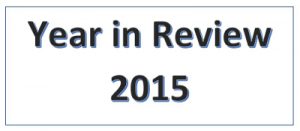By Jeffrey A. Roberts
CFOIC Executive Director
For open-government advocates, 2015 might be best remembered as the year we no longer needed to explain why it’s a bad idea for public officials to use private email accounts to conduct public business.
Hillary Clinton did that for us.
Unintentionally, of course, the former U.S. secretary of state and current presidential candidate helped to raise awareness among regular folks about an issue we’ve been harping on for a long time. When public officials use private email accounts, it’s a lot easier for those records (which legally may be public records) to be destroyed or hidden (putting aside any security issues associated with doing so).
In Colorado, 9NEWS investigative reporter Jeremy Jojola reported that all 100 members of the Colorado General Assembly use private accounts to conduct state business. Even “state.co.us” addresses used by some lawmakers merely direct emails to Gmail, AOL or other private accounts.
 “You have to trust legislators to dig through their own email and give you documents,” Luis Toro, director of Colorado Ethics Watch, told Jojola. “It’s just human nature. Even without any malicious intent, they’re going to err on not keeping things, especially if it makes them look bad.”
“You have to trust legislators to dig through their own email and give you documents,” Luis Toro, director of Colorado Ethics Watch, told Jojola. “It’s just human nature. Even without any malicious intent, they’re going to err on not keeping things, especially if it makes them look bad.”
OK, so Toro had to explain this back in May, just two months after the Clinton controversy erupted. But probably not so much after that.
The private emails flap was one of many transparency-related stories we highlighted in 2015 or broke ourselves. Here are some others:
Hidden property assessments. An Elbert County resident was puzzled when she looked online and couldn’t find the assessed value of real property owned by the county assessor and some other elected officials. Asking questions, we were astonished when Assessor Billie Mills told us we needed the elected officials’ permission to examine the records, which are supposed to be publicly available under the Colorado Open Records Act (CORA).
“Nothing in CORA allows public officials to withhold records that would disclose the tax assessment on a particular real estate property, including the name and address of the owner,” media attorney Michael Beylkin said.
Mills claimed that she and the other elected officials weren’t trying to hide the value of their properties. Public disclosure of the information might put their lives in danger, she said, adding, “The people in this county have a tendency to threaten us.” Five days after the posting of our story, Elbert County put the records online.
Hidden salary records. It took four CORA requests over five months, and a few letters written by a CFOIC volunteer attorney, for the Westminster school district to finally cough up salary records requested by former school board president Marilyn Flachman. Attorneys hired by the school district fought her requests at every turn, saying the district was not required to “create new records or manipulate existing records.” The district responded to her second request with a one-page pie chart.
Flachman eventually paid $745.50 for 2,982 hand-redacted paper copies. The district wanted to charge her $4,000, a price that was to include 100 hours of employee time. But her lawyer noticed that the district hadn’t posted a fee schedule for research and retrieval, as the law requires.
Hidden death penalty costs. Journalists and taxpayers wanted to know how much public money was spent to prosecute and defend mass killer James Holmes, but the state public defender’s office says it’s prohibited from releasing spending information on a particular case. A bill to make that agency subject to CORA died in the House Judiciary Committee. The public defender’s office eventually announced it had spent a total of $6.3 million on death penalty cases since 2002.
An “F” for Colorado. The Center for Public Integrity ranked each state on matters of accountability and transparency, giving Colorado an “F” grade for public access to information. Two reasons for the low ranking: The lack of an agency to monitor how access-to-information laws are working and no formal appeals process outside of the court system to assist people who are denied records.
Teacher sick-leave records. The Jefferson County teacher’s union lost a district court battle to block the release of the names of teachers who called in sick in September 2014 to protest school board policies. The Jefferson County Education Association “argues that sick leave records are ‘no less personal and deserving of protection from public disclosure’ than a teacher’s address, telephone number, or financial information,” the judge wrote. “The Court is not persuaded.” The case is on appeal.
Secret ballots. The Colorado Court of Appeals revived Arvada resident Russell Weisfield’s lawsuit against his city for using secret ballots to fill a city council seat, in apparent violation of the state’s Open Meetings Law. The appellate court said Weisfield’s complaint shouldn’t have been tossed on grounds he couldn’t prove he’d been personally harmed by the council’s hidden votes. Even so, the case eventually was settled out of court. The CFOIC reported that other local governments continue to use secret ballots to fill board vacancies.
Judicial branch records. The Colorado Supreme Court adopted new rules for accessing administrative records of the Colorado Judicial Branch, incorporating several recommendations made by the CFOIC, news media and members of the public. The justices reworked a proposal that had been much more restrictive, but retained certain provisions that treat judicial branch records differently than the records of the other two branches of state government and all local governments in Colorado. In particular, internal investigative files on judicial branch employees are not available for public inspection, except for the outcome of an investigation.
Database records. The year ended on a high note for journalists and members of the public who get frustrated when governments provide public records as PDFs, or refuse records requests altogether, rather than release a database or spreadsheet. After the Coloradoan newspaper couldn’t get a database of salary records from Colorado State University, two legislators announced plans for a 2016 bill to guarantee the right to obtain public records in a “digitized database format,” if that’s how a government maintains the records.
Nonprofit records. Also planned for 2016 is a bill that would open the records of nonprofits serving people with developmental and intellectual disabilities, if those organizations receive more than half their funds from public sources. Sen. Irene Aguilar, D-Denver, said the legislation is a response to myriad financial troubles at Denver-based Rocky Mountain Human Services, which is partially funded by property tax proceeds.
Pitkin County records. The district attorney in the Ninth Judicial District, Sherry Caloia, ordered Sheriff Joe DiSalvo to stop releasing records, including police reports, until cases are completely resolved. This came after the release of a video showing a Snowmass councilman tearing apart a county jail cell. “I told Ms. Caloia respectfully that I am going to keep releasing records the way this office has been doing it for the 27-plus years I’ve worked here,” DiSalvo said. “I think the public has a right to know what their police are doing and who they are involved with.”
Right to record cops. The legislature passed a law reinforcing a civilian’s right to record police. The measure was a response to Colorado and national incidents in which police have improperly seized phones and tablets, deleted video or otherwise interfered with someone’s First Amendment right to record law enforcement activities. The American Civil Liberties Union unveiled a smartphone app, Mobile Justice Colorado, to “empower Coloradans to witness and record police interactions” and submit recordings directly to the ACLU.
Voted ballots. Anonymous voted ballots are public records in Colorado, but it can be very expensive to obtain copies. That’s what election integrity activist Harvie Branscomb learned when he asked eight counties for ballot records from the Nov. 3 election. Adams County quoted him a price of “near zero,” but Jefferson County wanted advance payment of $12,475 and Douglas County asked for a $4,000 deposit. As Colorado moves toward a uniform voting system, transparency was among the evaluation criteria.
CORA for Coloradans only. Colorado State University briefly floated a proposal that some other states have adopted – make it so only in-state residents can request public records. CSU dropped the idea after critics pointed out that out-of-state students and their parents have an interest in the university’s affairs.
Holmes’ inmate number. When James Holmes was sentenced to life in prison for a July 2012 killing rampage, reporters for the Associated Press and other news organizations began asking for his inmate number so they could try to contact him. The answer was always “no” – for security reasons and to prevent him from trying to profit from his notoriety, according to the state Department of Corrections. The DOC disclosed the number after the AP’s repeated requests and a CFOIC inquiry.
Steamboat police probe. After the city’s top police officials were accused of creating a hostile work environment, Steamboat Springs released only a vague summary of findings from an internal investigation. A public outcry and pressure from the Steamboat Today newspaper prompted the city council to reverse a previous decision and make public a more thorough summary.
Claire Davis. After the murder of student Claire Davis was omitted from Arapahoe High’s school violence report, lawmakers passed a bill designed in part to encourage the flow of information on events leading up to violent school incidents. Davis’ family and Littleton Public Schools agreed to a process that included full discovery of events prior to the Arapahoe High shooting.
Changing the subject. When a reporter for the Daily Camera showed up at the Erie trustees’ annual retreat, the town administrator pulled from the agenda discussion of a planned commercial development at U.S. 287 and Arapahoe Road. “The information that I would share would be confidential in nature,” administrator A.J. Krieger said. “It’s not ready for any sort of public review or any sort of public announcement yet.”
Health exchange emails. The Independence Institute filed a lawsuit alleging that Colorado’s health care exchange improperly withheld employees’ emails requested under CORA. Connect for Health Colorado refused to turn over any emails to the Denver-based free-market think tank, claiming its requests for information were unreasonable, overly broad “fishing expeditions.”
Columbine “basement tapes.” Four hours of home videos made by Columbine High killers Eric Harris and Dylan Klebold were destroyed in early 2011, the Jefferson County Sheriff’s Office confirmed. This wasn’t common knowledge until someone filed a records request for the so-called “basement tapes.” The county attorney responded that the sheriff “no longer has any documents in its possession responsive to (this) request.”
Follow the Colorado Freedom of Information Coalition on Twitter @CoFOIC. Like CFOIC’s Facebook page. Do you appreciate the information and resources provided by CFOIC? Please consider making a tax-deductible donation.




